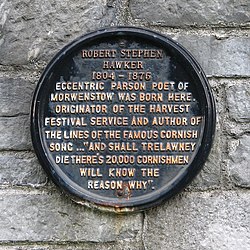'Ma lel an leuv, 'ma'n kledha mas
'Ma'n golon lowen, gwir!
Tus Mytern Jams 'wra konvedhes
Pandr'yll Kernowyon sur! Yw ornys le ha prys ankow?
'Verow Trelawny bras?
Mes ugans mil a dus Kernow
A wodhvydh oll an kas. - 'Verow Trelawny bras?
- 'Verow Trelawny bras?
- Mes ugens mil a dus Kernow
- A wodhvydh oll an kas.
'Medh aga Hapten, krev ha dreus,
Gwas lowen ev a veu,
"A pe Tour Loundres Karrek Loos,
Ni a'n kergh mes a'n le." "Ni 'dres an Tamar, tir dhe dir,
A pe 'vel Havren down,
Onan hag oll, dhe'n den eus fur;
Dhe'gan lettya 'fedh own." - 'Verow Trelawny bras?
- 'Verow Trelawny bras?
- Mes ugens mil a dus Kernow
- A wodhvydh oll an kas.
"Pan wrellen dos dhe Fos Loundres,
Dhe wel a bleg dhyn ni;
Ownegyon oll, gwrewgh dos yn-mes
Dhe dus eus gwell eso'hwi!” "Yn karhar kelmys rag ankow
Mirowgh Trelawny bras!
Mes ugans mil a dus Kernow
A wodhvydh oll an kas." - 'Verow Trelawny bras?
- 'Verow Trelawny bras?
- Mes ugens mil a dus Kernow
- A wodhvydh oll an kas.
| Gans kledha da ha dorn yw lel,
Gwir lowen an golon
Yth aswon Mytern Jamys fel
Pandr'wrello Kernowyon.
Yw ordnys prys ha le ankow?
'Verow Trelawny bras?
Ottomma ugens mil Gernow
A wodhvydh oll an kas. - 'Verow Trelawny bras?
- 'Verow Trelawny bras?
- Ottomma ugens mil Gernow
- A wodhvydh oll an kas!
Yn-medh an kapten, byw y woos,
Gwas joliv yn mesk kans:
"Tour Loundres kyn fe Karrek Loos
Y’n delirvsen dehwans.
Ni a dres Tamar, tir dhe dir,
An Havren ny’gan lett;
Ha skoodh reb skoodh, kowetha wir,
Piw orthyn ni a sett? - ‘Verow Trelawny bras?
- ‘Verow Trelawny bras?
- Ottomma ugens mil Gernow
- A wodhvydh oll an kas!
Devedhys bys yn fos Loundres
"Gwel teg dhyn" ni a gri;
"Dewgh mes, ownegyon oll, dewgh mes,
Gwell dus on esowgh hwi!"
Trelawny yw avel felon
Fast yn karharow tynn
Mes ugens mil a Gernowyon
Godhvos an ken a vynn. - ‘Verow Trelawny bras?
- ‘Verow Trelawny bras?
- Ottomma ugens mil Gernow
- A wodhvydh oll an kas!
|


